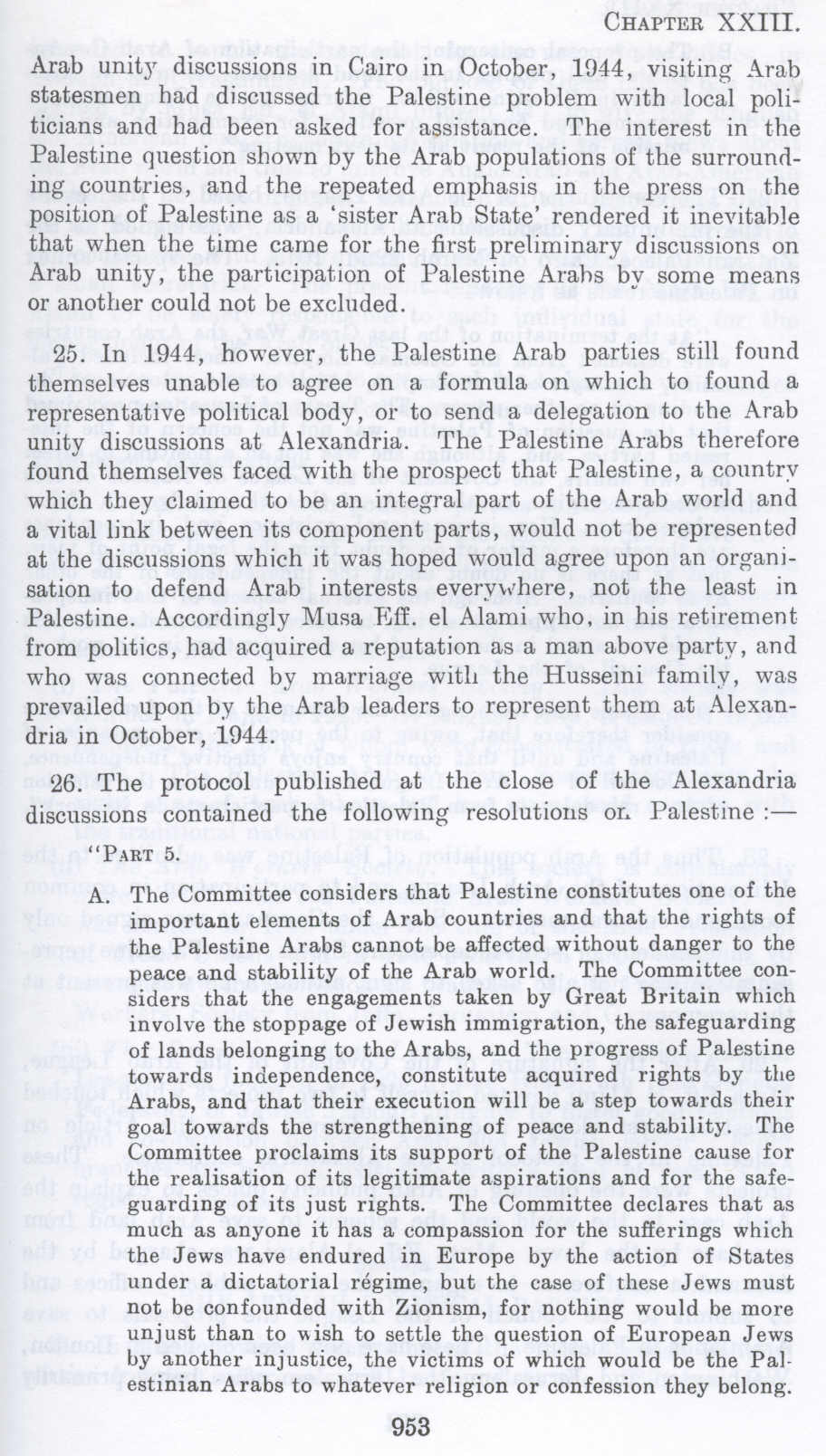| Prev | Next |  |
| Prev | Next |
| PalestineRemembered | About Us | Oral History | العربية | |
| Pictures | Zionist FAQs | Haavara | Maps | |
| Search |
| Camps |
| Districts |
| Acre |
| Baysan |
| Beersheba |
| Bethlehem |
| Gaza |
| Haifa |
| Hebron |
| Jaffa |
| Jericho |
| Jerusalem |
| Jinin |
| Nablus |
| Nazareth |
| Ramallah |
| al-Ramla |
| Safad |
| Tiberias |
| Tulkarm |
| Donate |
| Contact |
| Profile |
| Videos |
British Mandate: A Survey of Palestine: Volume II - Page 953 |
Disclaimer
The above documents, article, interviews, movies, podcasts, or stories reflects solely the research and opinions of its authors. PalestineRemembered.com makes its best effort to validate its contents.


Post Your Comment
*It should be NOTED that your email address won't be shared, and all communications between members will be routed via the website's mail server.
Arab unity discussions in Cairo in October, 1944, visiting Arab statesmen had discussed the Palestine problem with local politicians and had been asked for assistance. The interest in the Palestine question shown by the Arab populations of the surrounding countries, and the repeated emphasis in the press on the position of Palestine as a 'sister Arab State' rendered it inevitable that when the time came for the first preliminary discussions on Arab unity, the participation of Palestine Arabs by some means or another could not be excluded.
25. In 1944, however, the Palestine Arab parties still found themselves unable to agree on a formula on which to found a representative political body, or to send a delegation to the Arab unity discussions at Alexandria. The Palestine Arabs therefore found themselves faced with the prospect that Palestine, a country which they claimed to be an integral part of the Arab world and a vital link between its component parts, would not he represented at the discussions which it was hoped would agree upon an organisation to defend Arab interests everywhere, not the least in Palestine. Accordingly Musa Eff. el Almi who, in his retirement from politics, had acquired a reputation as a man above party, and who was connected by marriage with the Husseini family, was prevailed upon by the Arab leaders to represent them at Alexandria in October, 1944.
26. The protocol published at the close of the Alexandria discussions contained the following resolutions or. Palestine :-
PART 5.
A. The Committee considers that Palestine constitutes one of the important elements of Arab countries and that the rights of the Palestine Arabs cannot be affected without danger to the peace and stability of the Arab world. The Committee considers that the engagements taken by Great Britain which involve the stoppage of Jewish immigration, the safeguarding of lands belonging to the Arabs, and the progress of Palestine towards independence, constitute acquired rights by the Arabs, and that their execution will be a step towards their goal towards the strengthening of peace and stability. The Committee proclaims its support of the Palestine cause for the realisation of its legitimate aspirations and for the safeguarding of its just rights. The Committee declares that as much as anyone it has a compassion for the sufferings which the Jews have endured in Europe by the action of States under a dictatorial regime, but the case of these Jews must not be confounded with Zionism, for nothing would be more unjust than to wish to settle the question of European Jews Ly another injustice, the victims of which would be the Palestinian Arabs to whatever religion or confession they belong.
953